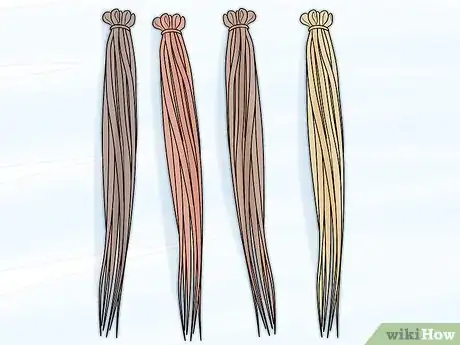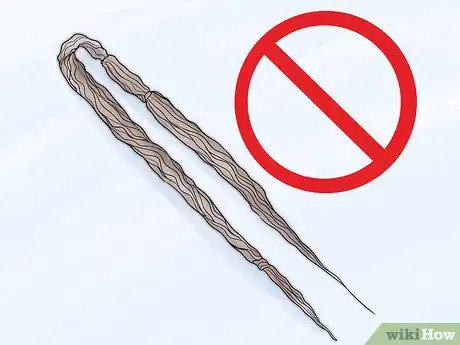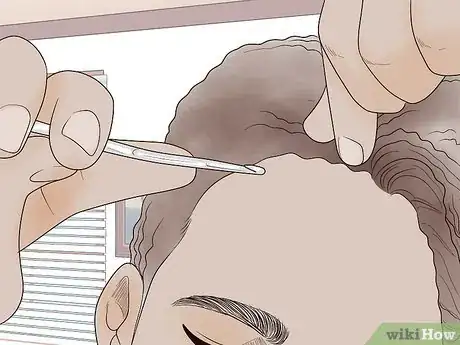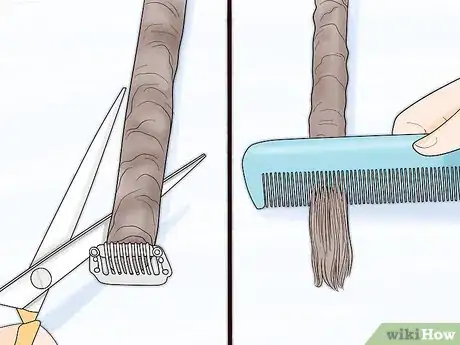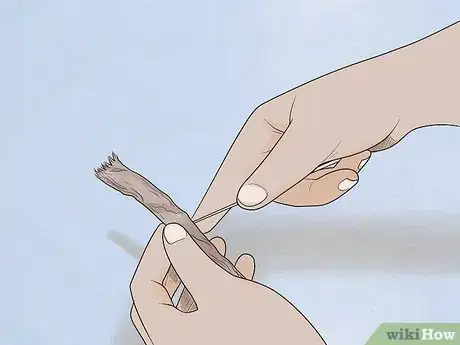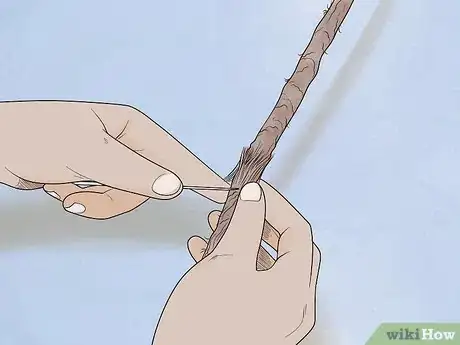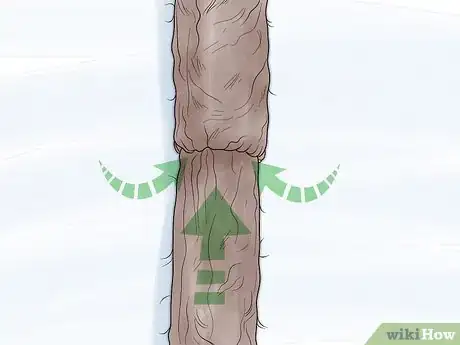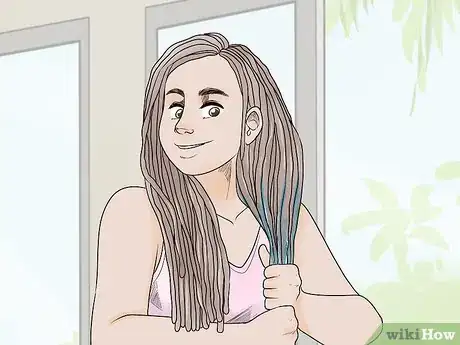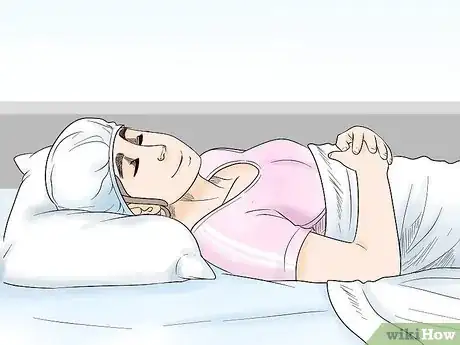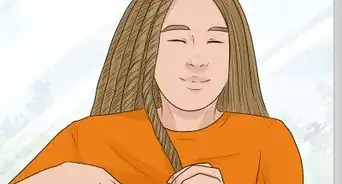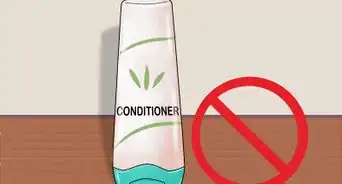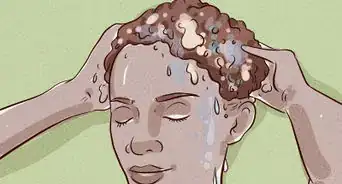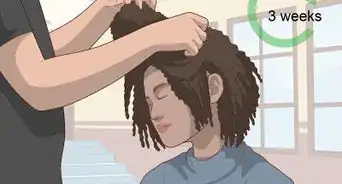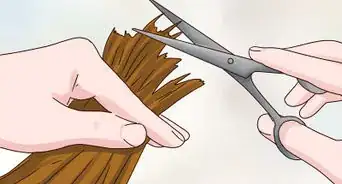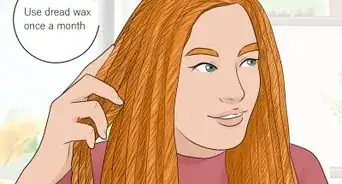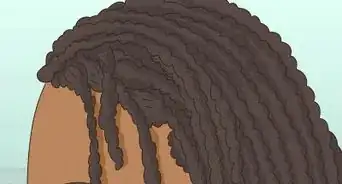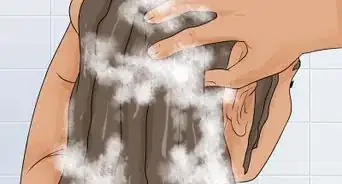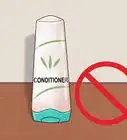This article was co-authored by Shun Pittman. Shun Pittman is a Master Cosmetologist, Author, Owner, and Founder of Corps d’Elite Salon and Corps d’Elite Beauty. With over 25 years of international experience, she is dedicated to and specializes in providing luxury salon services to all hair types and textures and every skin tone and shade. Her services include hair conditioning treatments, cutting, coloring, styling, extensions, and makeup application. Shun has experience working with, coaching, training, and mentoring beauty professionals from multiple companies including L'Oréal, Wella, Matrix, Paul Mitchell, Redken, Big Sexy Hair, and Toni & Guy. She is also a host for national and local media outlets and her work has been featured in The Washingtonian, The Cheddar Network, and WJLA Good Morning Washington's Beauty and Fashion Police segments. Shun is the author of “50 Things Your Hairdresser Wants YOU to Know (and a few things we don’t...)".
There are 8 references cited in this article, which can be found at the bottom of the page.
This article has been viewed 225,243 times.
If you want to rock long locs but you're still growing yours out, don't worry! You can easily add extensions to your locs to make them as long as you'd like. You may still find these advertised as "dreadlock extensions," but due to the negative connotations and racial history associated with the word "dreadlocks," the preferred term is actually "loc." Our article will show you how to get dramatically long locs in no time!
Steps
Purchasing Loc Extensions
-
1Buy synthetic locs. Many people prefer to buy synthetic loc extensions because they’re relatively inexpensive. Synthetic hair is also great for locs because it tangles easily, creating locs more quickly. However, you can’t use heat products on synthetic extensions or they will melt. Additionally, you can’t dye or perm synthetic hair extensions.
- Synthetic locs and extensions can be bought online or at specialty beauty supply stores.
-
2Buy natural locs. If you like using heat products or dyeing your hair, purchase natural extensions. These extensions can be treated like your natural hair. However, keep in mind that these extensions will be much more expensive than synthetic extensions.
- Natural locs and extensions can be found online and at many beauty supply stores.
Advertisement -
3Avoid buying double-ended loc extensions. These extensions look like long locs with an un-twisted section in the middle. Double-ended loc extensions are an excellent choice for people who want more volume in their locs. However, if they’re installed too tightly, the weight of the extensions will pull on your scalp and lead to hair loss.
- If you want these extensions, have them installed professionally.
- Instead of choosing double-ended extensions, purchase single-ended extensions or regular extensions that you can twist yourself.
Installing Your Extensions
-
1Do the “needle test.” If your locs are too tight, you may not be able to add extensions on your own. Do the needle test by pushing a needle through a thick section of a loc. If the needle slides though, you can install your own extensions. If it doesn’t, you need to have your extensions professionally installed using loc adhesives.[1]
- Do an online search to find salons that service locs in your area.
-
2Twist any undone extensions. If you purchased regular clip-in extensions, you will need to coil them yourself. First, ask a friend to hold the clip end of the extension. Hold the tail end of the extension tightly in one hand. Next, use a fine-toothed comb to brush the hair against the grain, starting at the clip and working in small sections. This will create small knots in the hair, creating the locs.
- After you’ve combed the entire extension, pull it down with your hand to smooth it out and repeat the process.
- Continue combing and smoothing the extension until it’s tightly locked.[2]
-
3Prepare your locs. Your hair should already be locked before you put in any extensions. If you have blunted ends on your locs, cut off the tips and brush them out. You should have one to two inches (2.5-5 centimeters) of loose hair at the ends of your locs.[3]
- Use a fine-toothed comb or small brush to loosen the ends of your locs.
- You can loosen all of the ends at once or do it as you apply the extensions.
-
4Rough up the end of your extension. If your extension came with a clip on the end, cut this section off. Next, brush out the end so that there are two to three inches (5-7.5 centimeters) of loose hair at the top.
- Cut and loosen each extension as you need it. Otherwise, you may unravel unused extensions.
-
5Secure the thread into the extension. Thread a sewing needle with about 12-14 inches (30-35 centimeters) of thread. Next, sew a few small stitches into the base of the loose section of the loc, close to the knotted section. Make sure these stitches are as tight as you can make them.
- Leave two to three inches (5-7.5 centimeters) of loose thread at the beginning of the stitches so that you can tie them off later.
- Purchase sturdy thread that closely matches your hair color.
-
6Sew the extension onto your loc. Place the loose, stitched part of your extension against the loose end of your natural loc. Center the extension so that an inch of your loose hair is against the tight section of the extension. Sew the center of the extension against the center of your loc using small, tight stitches.[4]
-
7Wrap your hair around the extension. Press the extension into your loc, wrapping the sides around the extension like a tube. Add a few tight stitches to secure these hairs into place. Keep adjusting the loc until the top of the extension is completely covered by your natural hair.
- Wrapping will help blend the extension into your hair. The better the top of the extension is covered, the better it will blend.
-
8Tie off the thread. Find the loose end of the thread inside the extension. Tie both ends of the thread tightly together, knotting it several times. Use sharp sewing scissors to cut off the tails of the knot, leaving about an inch (2.5 centimeters).
- Tuck the ends of the thread into the center of your loc to hide them.
-
9Blend the two pieces together. Insert a .5 mm crochet hook through the center of your loc. Gather some loose hair into the hook and gently pull it back through the extension. Repeat this process until all of the loose hair has been incorporated into the loc, including the loose hair of the extension.
- Once the loose hair is incorporated, rub the loc between your palms to rough up the extension connection.
- Avoid using larger crochet hooks as they can damage your hair.[5] A small .5 mm crochet hook can be found online or at sewing supply stores.
Taking Care of Your Extensions
-
1Wash your hair 2-3 times a week. If you wash your hair too often, your locs will become loose and frizzy. However, if you don’t wash them enough, they’ll start to smell bad. While washing, focus on massaging your scalp and gently massaging the base of your locs. Avoid using conditioner or any detanglers.
-
2Dry your hair completely. If your locs stay wet for too long, mildew will grow on the inside. After showering, squeeze as much water as you can out of your locs and into the shower. Next, wrap your hair in a fluffy towel for 10-20 minutes. Last, allow your hair to air dry before putting it up or wearing a hat. [8]
- If your locs still haven’t air-dried within an hour, use a hair dryer to speed up the process.
- Be careful not to melt any synthetic extensions with the hairdryer.
-
3Protect your extensions while you sleep. When you sleep with locs, the friction of your head against the pillow can loosen or tangle your extensions. Avoid this problem by wearing a silk hair covering while you sleep. Alternatively, you can use a silk pillow or braid your hair to keep it all in one place.
- Never sleep with wet locs as they won’t dry properly.
Expert Q&A
-
QuestionCan I get this done by a professional?
 Shun PittmanShun Pittman is a Master Cosmetologist, Author, Owner, and Founder of Corps d’Elite Salon and Corps d’Elite Beauty. With over 25 years of international experience, she is dedicated to and specializes in providing luxury salon services to all hair types and textures and every skin tone and shade. Her services include hair conditioning treatments, cutting, coloring, styling, extensions, and makeup application. Shun has experience working with, coaching, training, and mentoring beauty professionals from multiple companies including L'Oréal, Wella, Matrix, Paul Mitchell, Redken, Big Sexy Hair, and Toni & Guy. She is also a host for national and local media outlets and her work has been featured in The Washingtonian, The Cheddar Network, and WJLA Good Morning Washington's Beauty and Fashion Police segments. Shun is the author of “50 Things Your Hairdresser Wants YOU to Know (and a few things we don’t...)".
Shun PittmanShun Pittman is a Master Cosmetologist, Author, Owner, and Founder of Corps d’Elite Salon and Corps d’Elite Beauty. With over 25 years of international experience, she is dedicated to and specializes in providing luxury salon services to all hair types and textures and every skin tone and shade. Her services include hair conditioning treatments, cutting, coloring, styling, extensions, and makeup application. Shun has experience working with, coaching, training, and mentoring beauty professionals from multiple companies including L'Oréal, Wella, Matrix, Paul Mitchell, Redken, Big Sexy Hair, and Toni & Guy. She is also a host for national and local media outlets and her work has been featured in The Washingtonian, The Cheddar Network, and WJLA Good Morning Washington's Beauty and Fashion Police segments. Shun is the author of “50 Things Your Hairdresser Wants YOU to Know (and a few things we don’t...)".
Master Cosmetologist, Global Salon Educator & Author Yes, most braiders are skilled at “fauxlocking” or “fauxlocks”. Do your due diligence. Schedule a consultation prior to securing an appointment with a braider. Ask for pictures of their work. Ask for a rough estimate of how long the service will take. Other questions like the cost and maintenance will be beneficial for you to know as well.
Yes, most braiders are skilled at “fauxlocking” or “fauxlocks”. Do your due diligence. Schedule a consultation prior to securing an appointment with a braider. Ask for pictures of their work. Ask for a rough estimate of how long the service will take. Other questions like the cost and maintenance will be beneficial for you to know as well. -
QuestionHow can I download a video about putting in dreadlocks?
 Community AnswerYou can just go on YouTube to find videos about putting in dreadlocks. You can then bookmark them to come back to later on.
Community AnswerYou can just go on YouTube to find videos about putting in dreadlocks. You can then bookmark them to come back to later on. -
QuestionHow do I tie the to fix the synthetic hair on my natural dread?
 Cj the girlCommunity AnswerGet a long piece of the synthetic hair and hold it with one hand in the middle. Put your other hand's index finger in the direct middle of the hair and put the thumb of that same hand under the hair and pinch the hair again with the other hand. Next, put the hair you are pinching around the root of your dread and simply wrap it around your natural hair.
Cj the girlCommunity AnswerGet a long piece of the synthetic hair and hold it with one hand in the middle. Put your other hand's index finger in the direct middle of the hair and put the thumb of that same hand under the hair and pinch the hair again with the other hand. Next, put the hair you are pinching around the root of your dread and simply wrap it around your natural hair.
Things You’ll Need
- Synthetic or natural extensions
- A fine-toothed comb
- Sewing scissors
- A .5 mm crochet needle
- A needle and thread
References
- ↑ http://ragingrootsstudio.com/ext-general-info/
- ↑ https://www.youtube.com/watch?v=Hnfinze-_co&feature=youtu.be&t=523
- ↑ https://www.youtube.com/watch?v=N-iwiEUxcl8&feature=youtu.be&t=219
- ↑ https://www.youtube.com/watch?v=rSZbrY9ad9U&feature=youtu.be&t=87
- ↑ https://www.youtube.com/watch?v=Hnfinze-_co&feature=youtu.be&t=393
- ↑ http://www.dreadheadhq.com/pages/washing-dreadlocks-is-more-important-than-you-think
- ↑ http://www.purplefinchaccessories.com/dreadcare#installation
- ↑ http://www.dreadheadhq.com/pages/how-do-you-get-your-dreadlocks-dry
About This Article
Before you put extensions in your dreads, you'll need to make sure they're not too tight. To test how tight your dreads are, push a needle through the thick section of one of your dreadlocks. If it slides through, your dreads are loose enough for extensions. Prepare the extensions by cutting off the clip at the end of each one and then brushing it out so there are 2 to 3 inches of loose hair at the top. Hold the loose part of the hair extension up to the loose part of your dreadlock and begin sewing them together in small, tight stitches. Wrap your hair around the extension where the stitches are to help blend them. Tie off the thread next and then use a crochet hook to further blend your dreadlock and the extension. For more information on putting extensions in your dreads, like how to take care of the extensions, read on!
